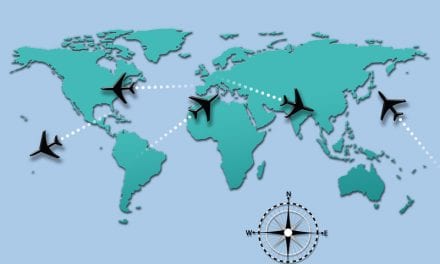Though an isolated incident of jet lag does not generally warrant professional treatment, the temporary condition of an out-of-sync body clock after traveling across time zones offers important insights into the bigger picture of sleep in the context of circadian rhythms.
I’ve been thinking about jet lag a lot lately because my husband and I are traveling to Europe later this month from our home in California. Our first stop is 9 hours ahead of the Pacific Time Zone and our second stop is 8 hours ahead. So is there a way to quickly acclimate to such changes so as to fully enjoy the new city?
The existing knowledge on adjusting sleep times in advance and planning light exposure at strategic times is important and valid, as is considering over-the-counter melatonin (depending on the direction of travel). But newer, and perhaps more surprising, therapies for jet lag are on the horizon—and may prove to work more quickly and be more easily adhered to.
A study by Stanford University School of Medicine found that exposing people to short flashes of light while they’re sleeping could provide a fast, efficient method of preventing jet lag.1 “This could be a new way of adjusting much more quickly to time changes than other methods in use today,” said Jamie Zeitzer, PhD, in a release.
This “biological hacking” works for two reasons, explain the researchers: retinal cells that transmit the light information to the circadian system continue to fire for several minutes after the stimulus (in this case, flashing light) is removed, and gaps of darkness between the light flashes allow the pigments in the eye that respond to the light to regenerate.
A study from McGill University researchers found that the brain’s biological clock stimulates thirst in the hours before sleep, even though there is no immediate physiological reason for this behavior.2 The team found that restricting the access of mice to water during the surge period resulted in dehydration towards the end of the sleep cycle. So the increase in water intake before sleep is a preemptive strike that guards against dehydration. “More importantly, this advance in our understanding of how the clock executes a circadian rhythm has applications in situations such as jet lag and shift work,” said the study’s senior author Charles Bourque, PhD, in a release. “Knowing how the clock works gives us more potential to actually do something about it.”

Sree Roy
[email protected]
Researchers from the University of Surrey discovered that meal times are important for helping long-haul cabin crew to adapt the body clock during days off.3 “We found that many crew tend to rely on sleep rather than eating strategies to alleviate symptoms of jet lag, but this study has shown the crucial role meal times can indeed play in resetting the body clock,” said Cristina Ruscitto, PhD, in a release.
In addition to the potential for better solutions to jet lag, these studies and similar studies may ultimately lead to the development of new therapies for circadian rhythm sleep disorders, which would be a boon for sleep professionals and patients alike.
Sree Roy is editor of Sleep Review.
References
1. Najjar RP, Zeitzer JM. Temporal integration of light flashes by the human circadian system. J Clin Invest. 2016;126(3):938–947.
2. Gizowski C, Zaelzer C, Bourque CW. Clock-driven vasopressin neurotransmission mediates anticipatory thirst prior to sleep. Nature. 29 September 2016;537: 685–8.
3. Ruscitto C, Ogden J. The impact of an implementation intention to improve mealtimes and reduce jet lag in long-haul cabin crew. Psychol Health. 14 Oct 2016:1-17.





